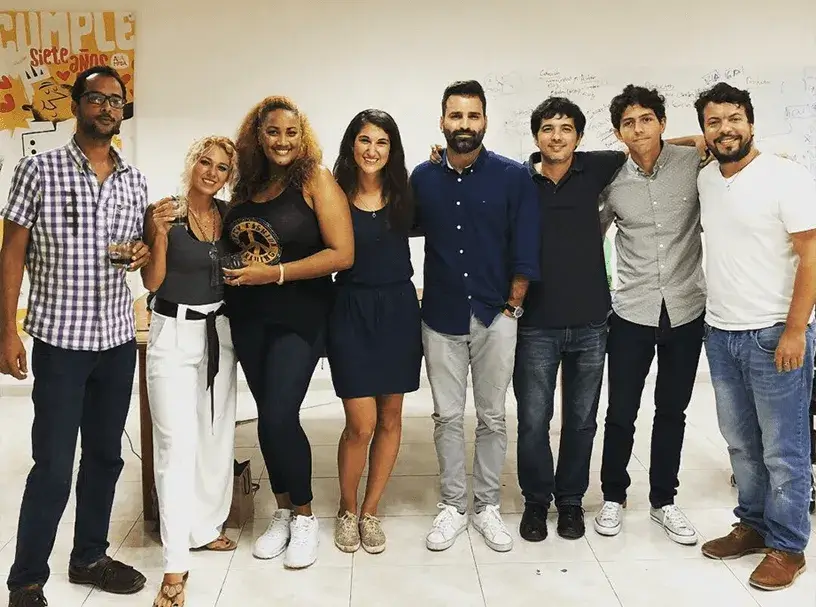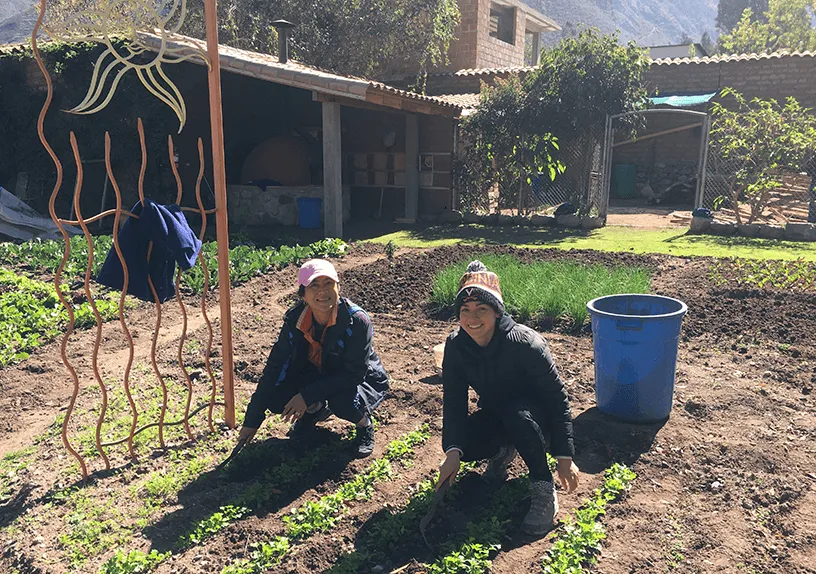June 29, 2022
| by Kevin CoolWhen you hear their stories, it’s easy to understand why all these years later the excitement bubbles back to the surface. Stephen Lee spent four weeks living in a tiny village in remote eastern Bhutan, working with farmers who grow hazelnuts. Sara Egozi went to Havana, helping a nascent venture capital firm identify promising Cuban startups. Abhay Jain outlined an expansion strategy in Southeast Asian countries for a waste management company based in Dubai.

For 100 years, we’ve been dedicated to the things that haven’t happened yet, and the people who are about to dream them up. Join us in commemorating our Centennial in 2025.
If you ask Lee, MBA ’13, what the best part of that Bhutan experience was, he pauses for a moment, considering. It might’ve been the setting — lush, velvety mountains punctuated by tidy farm plots and an occasional temple situated on a precarious cliff top. It might’ve been the people, who warmly embraced visitors each summer. It might’ve been the work itself, impactful projects for a social enterprise company devoted to helping the farmers make a sustainable living. Lee smiles. “Can I just say the whole thing?”
Lee’s evident delight is typical of the reaction one encounters when speaking to the GSB alumni who have participated in the Global Management Immersion Experience, a four-week summer program that sends dozens of MBA students around the world each year. (At least it did until the pandemic hit, forcing projects to be performed virtually.) This summer, for the first time since 2019, GMIX again offered the real thing, just in time to celebrate its 25th year.
Established in 1997 with a single program in China, GMIX has since sent 1,500 students to 92 countries, and established a cohort of sponsor partners that number in the hundreds.
According to GSB director of global experiences Katherine Robinson, the program aims to give students meaningful opportunities in a short enough time that they can still do internships or other summer activities. “The premise was, let’s have a project that is concrete and discrete and fits in those four weeks where students can test a hypothesis,” she says. “A student might say ‘I’m not sure I can survive in Beijing not speaking Mandarin. Can I go and try without a lot of strings attached?’”
GMIX provides opportunities based on projects submitted by sponsors; students also develop their own ideas and use their networks to find a sponsor to work with. Most of the costs are absorbed by the sponsors, while GMIX provides fill-in stipends and logistical support. Robinson says the possibilities are only limited by a student’s imagination and hustle. “I always say this ranges from a private equity firm in London to a mushroom farm in rural Rwanda, and everything in between. We are open to all types of organizations.”
Going Deep in Havana
Egozi, MBA ’19, was one of those students who sourced her own opportunity. The daughter of a Cuban-American couple whose families fled the island when Fidel Castro came to power, Egozi was especially interested in Cuba. She made her way there in the summer of 2018 with the help of GSB alumni Jesse Sullivan, MBA ‘15, and Ozair Ali, MBA ‘16, cofounders of the venture capital firm Alter Global. The firm explored a handful of Cuban companies, including AlaMesa, which had developed a Yelp-like app for Havana restaurants. Ostensibly, Egozi’s job was to put together a marketing plan to help the company expand, but Egozi decided to go deep, embedding herself in the business and the local community.
“With a context like Cuba, cultural and political understanding is critical to shaping the business,” she says. “So before putting any pen to paper, before looking at any balance sheets or data, I had a lot of conversations.
“If I was going to earn the trust of the [AlaMesa] co-founders, I was going to have to eat with them, think like them, hang out in the local spots they visited after work. If I had showed up to work every day and taken my lunch at a place the Americans ate, they would’ve rolled their eyes.”

Sara Egozi, center, with the AlaMesa team in Havana. | Courtesy of Sara Egozi
AlaMesa was experimenting with a delivery service and looking for ways to tap into the American market in South Florida, where ex-pats can purchase meals for family members in Cuba. In addition to drawing upon Egozi’s marketing savvy, AlaMesa’s founders also wanted her perspective as an American with Cuban roots. “They saw me as an intermediary because I understood what was happening in the United States. But I had to learn and ask questions about what that meant in Cuba, and what they did and didn’t want to do.” AlaMesa’s online food services continue to grow today.
Egozi is now chief of staff to the founder and CEO of Common Sense Media and credits her GMIX experience for a mindset that values resourcefulness. “These entrepreneurs were very scrappy,” she says. “I learned so much from them about how to navigate the lack of resources and constraints they faced. As I seek new challenges through my career, there’s no question I will think back to that experience in Havana.”
The “Win-Win” for Students and Sponsors
The sponsors are the bedrock of the program, Robinson says. Often, but not necessarily, they have a Stanford connection, including several whose companies, like Alter Global, were started by MBA alums. One of those is the Mountain Hazelnuts Group in Bhutan, where Lee worked. Co-founded by Daniel Spitzer, MA ’82, it is one of the longest-serving sponsors in the GMIX program.
Another is Willka T’ika Wellness Retreat, located in the Peruvian Andes and owned by Terry Cumes, MBA ’04. Cumes has sponsored GMIX students for more than a decade and looks forward to their arrival every summer. “We’re looking for someone who really wants to be here and is really interested in our business,” he says. “They help us in many ways, both at the tactical level — things that are small and implementable like doing a new menu — as well as something larger such as financial forecasting.”

Kiki Davis, right, helped with both large and small projects at Willka T’ika in Peru. | Courtesy of Kiki Davis
And it isn’t all about the work, he notes. “I think ultimately what the GMIX program was created for was to give people a cultural experience, because GSBers don’t need me to show them how to do strategic planning or marketing,” Cumes says. “What they do need is for me to show them what it’s like to work with 20 people who mostly speak Quechua, to integrate with them, play with them, and laugh with them.”
One of his favorite recent moments was when Kiki Davis, MBA ’20, scored a goal during a pickup soccer game with staff members during her last week at Willka T’ika. “We had classmates visiting, so it was this GSB cultural moment at 9,000 feet in the middle of the Andes,” Cumes recalls.
There are several reasons GMIX is appealing to sponsor organizations, Robinson says. “Sometimes they’re not very well resourced or don’t have a big staff, so their projects sit on the back burner. In other cases, sponsors simply hold onto projects until they have the right expertise.”
Sponsors must be decisive about what project can be finished in that short timeframe and why it is important. And they must be thoughtful about what will be required to help students succeed. “Does it make sense for you to travel? Should we bring you to business dinners with clients? Its so much more than just hiring somebody and having them do the work,” Robinson says.
For Andrea Böhmert, co-managing partner at Knife Capital, a South African investment firm, GMIXers have become a depended-upon resource. “What we love about the Stanford GMIX students is that they have a different frame of reference,” she says. “Sometimes our Stanford students give us an insight that we hadn’t thought about.” She points to a scooter company Knife Capital was considering until a GMIXer pointed out that the distances its proposed customers would have to travel far exceeded what was typical for scooter users. “That actually convinced us not to do the deal.”
And the connection doesn’t end when the students go home, Böhmert says. “Quite often, when we are in San Francisco or in New York, we reach out to them and try to get together. This is more than just a one-off, little four-week project. This is about building long-term relationships.”
That may be one reason Böhmert has a special method for selecting which GMIX students will be right for Knife Capital. “I ask about hobbies,” she says. “One of my favorites of all time got the job because she promised she could make a fantastic cappuccino. We had a pig-wrestling champion from Arizona. We had someone who translated Harry Potter into Vietnamese. That’s what I look for — some small difference.”
Number Crunching in Dubai
Jain, MBA ‘19, worked for a multinational waste management company, Averda, in Dubai in 2018. Like Egozi’s, his GMIX was self-sourced, facilitated by an introduction by GSB economics professor Yossi Feinberg to Mazen Chebaklo, Averda’s COO and a former student in the Stanford Executive Program. “Even in our first conversation, Mazen was excited about the prospect of me joining Averda,” Jain says.
Once there, Jain set about conducting an analysis of the potential waste management market in Southeast Asia. “It was 15 days of me trying to learn about their business, and 15 days of me trying to put something together to add value. Understanding that it’s only four weeks, you’re still bringing something to the table that was useful for them.”
As is often the case with a GMIX experience, it was the unexpected that led to the greatest learning, says Jain, now an engagement manager at McKinsey & Company. “One day everyone at Averda was in a firefighting mode because the sheik decided to give 5,000 camels to the small town of Sharjah. Camels poop a lot, so the whole waste management system broke down. They were not ready for 5,000 camels.” It was a lesson in the cultural nuances of running a business, Jain says.
The intangible value of the GMIX internship is essential, according to Lee, who says his brief time in Bhutan remains one of the best experiences of his life. “Part of my job was to survey farmers, both to collect data — like, how many yaks do you have? — and to get their opinions. I stayed overnight with one of the farmer’s families. They made me dinner and served me ara, which is sort of like their moonshine.” Lee pauses and shakes his head, in a quiet reverie.
“I can’t emphasize enough how this experience opened up doors; just precious opportunities,” says Lee, who is now vice president of EMEA brand and portfolio strategy and innovation at Warner Bros. Discovery in London. “What I did shouldn’t be possible; it’s like some crazy fantasy script that somebody made up. But it happened, and the only reason it happened is because of GMIX.
“Hats off to them,” he says. “I hope they have another 25 years.”

For media inquiries, visit the Newsroom.



